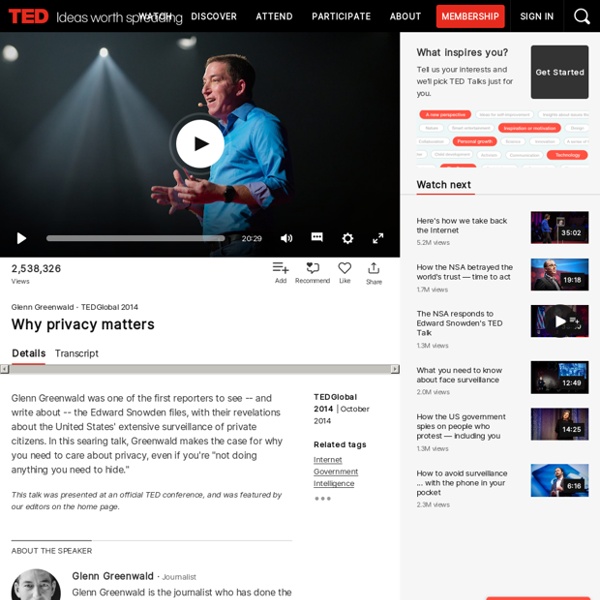



https://www.ted.com/talks/glenn_greenwald_why_privacy_matters
Related: Seconde SNT • EDUC 548 • EDUC 548Animated Overview: Using Password Managers to Stay Safe Online %3Ciframe%20allowfullscreen%3D%22%22%20mozallowfullscreen%3D%22true%22%20src%3D%22https%3A%2F%2Farchive.org%2Fembed%2Fusing-password-managers-to-stay-safe-online%3Fautoplay%3D1%22%20webkitallowfullscreen%3D%22true%22%20width%3D%22640%22%20height%3D%22360%22%20frameborder%3D%220%22%20allow%3D%22autoplay%22%3E%3C%2Fiframe%3E Privacy info.This embed will serve content from archive.org You get a lot done on the Internet, and that means you probably have a lot of accounts on many different websites. But did you know that if you use the same password
The Harmful Effects of Too Much Screen Time for Kids Today’s children have grown up with a vast array of electronic devices at their fingertips. They can't imagine a world without smartphones, tablets, and the internet. The advances in technology mean today's parents are the first generation who have to figure out how to limit screen time for children. While digital devices can provide endless hours of entertainment and they can offer educational content, unlimited screen time can be harmful.1 The American Academy of Pediatrics recommends parents place a reasonable limit on entertainment media. Despite those recommendations, children between the ages of 8 and 18 average 7½ hours of entertainment media per day, according to a 2010 study by the Henry J.
The Key To Gen Z Is Video Content If you’re anything like me, you’ll do just about anything to avoid watching a video and skip to the text instead. Then again, if you’re anything like me, you’re clearly not part of the Gen Z crowd making video content more popular than ever. Generational differences in social media use We’ve long been told that as far as social media is concerned, Facebook is now the realm of “old people.” Lifelong learning is becoming an economic imperative THE RECEPTION AREA contains a segment of a decommissioned Underground train carriage, where visitors wait to be collected. The surfaces are wood and glass. In each room the talk is of code, web development and data science. At first sight the London office of General Assembly looks like that of any other tech startup. But there is one big difference: whereas most firms use technology to sell their products online, General Assembly uses the physical world to teach technology.
Mission-oriented millennials, Gen Z object to words ‘convert' and ‘winning souls’ in outreach Teens and young adult Christians do not like to use certain words, including “converts” and “winning souls,” while talking about the reasons behind sharing their faith with others, a study has found. Millennials and Gen Z teens are more cautious than older Christians about the words they use when they discuss missions, according to the evangelical Christian polling firm Barna Group, which looked at data from its The Future of Missions report which highlights the way different age groups talk about missions and why teens and young adults lean away from certain terminology. For example, 35% of young adults and 38% of teens said the word “convert” tops the list of objectionable mission-related words for them.
5 ed tech trends to watch in 2021 Editor’s note: This story is part of a series on the trends that will shape K-12 in 2021. You can find all the articles on our trendline. When the coronavirus pandemic hit the U.S. in March, Joliet Public Schools in Illinois went into what Director of Technology and Information Services John Armstrong calls “emergency learning.” Gardner's Theory of Multiple Intelligences When you hear the word intelligence, the concept of IQ testing may immediately come to mind. Intelligence is often defined as our intellectual potential; something we are born with, something that can be measured, and a capacity that is difficult to change. In recent years, however, other views of intelligence have emerged. One such conception is the theory of multiple intelligences proposed by Harvard psychologist Howard Gardner.
30 K-12 edtech predictions for 2021 When we posted our 2020 predictions on January 1 last year, we–along with the majority of the world–definitely didn’t anticipate the curveball that was (and continues to be) the global COVID-19 pandemic. 2020 has been called a dumpster fire, the worst year in recent memory, and more. Abrupt shifts to virtual and hybrid learning laid bare the vast inequities that exist in the U.S. education system. Top EdTech Trends for The Year 2021 There have been numerous innovations in the field of education technology, also known as EdTech, which paved way for a complete transformation of the way education would be imparted to students. Some of these innovative technologies include artificial intelligence, augmented reality, virtual reality, virtual classrooms, cloud-based education, one-on-one learning (personalized learning), and many more. Education is now no longer restricted to a traditional classroom-based environment. Technology has enabled education to reach students located across the globe, without the need for being physically present in a classroom. In the current COVID-19 pandemic, EdTech innovations have revolutionized the education sector. These technologies have ensured continuity of education to students in the period when the world went into a complete lockdown.
4 Emerging EdTech Trends in 2021 Covid-19 has not only changed education as we know it, but it has forced education technology (EdTech) to up its game. EdTech has been crucial since the start of this worldwide pandemic. Schools have used Google Classroom and other tools to teach their students and send them work. Parents and caregivers have used it throughout this time to help during homeschooling, and with new cases of Covid-19 ramping up, it seems EdTech is going nowhere soon. The Key To Gen Z Is Video Content If you’re anything like me, you’ll do just about anything to avoid watching a video and skip to the text instead. Then again, if you’re anything like me, you’re clearly not part of the Gen Z crowd making video content more popular than ever. Generational differences in social media use We’ve long been told that as far as social media is concerned, Facebook is now the realm of “old people.” Perhaps fed up with watching people rant about their personal politics, Millennials and Gen Z have moved on to platforms like Instagram, Snapchat, and YouTube.